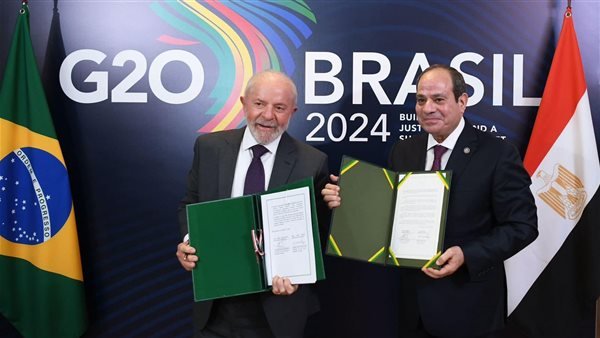
Monday 18/November/2024 – 12:13 PM
The official spokesman for the Presidency of the Republic published, A joint statement to launch a strategic partnership between Egypt and the Republic of Brazil, In light of the 100th anniversary of diplomatic relations between Egypt and Brazil, which are characterized by enhancing diversity and deepening bilateral relations, as well as the bonds of friendship that unite the peoples of the two countries.
The statement added: Taking into account that both countries are members of the BRICS, a grouping based on the spirit of respect, solidarity and mutual understanding among its members; And in confirmation of the two countries’ desire to work together to consolidate peace, promote a more representative and just international system, renew and reform the multilateral system, and achieve sustainable development and comprehensive growth.
Emphasizing the priority that countries attach to combating hunger, poverty and inequality, at the local and international levels;
While also emphasizing the commitment of the two countries to strengthening the paths of regional integration in which they share, and advancing trade and cooperation between countries of the Global South; Expressing commitment to strengthening and expanding bilateral relations and cooperation in all areas of common interest;
He continued: With reference to the memorandum of understanding between Egypt and Brazil regarding establishing a mechanism for strategic dialogue, signed on December 27, 2009, and the memorandum of understanding regarding launching political consultations between Egypt and Brazil, signed on December 9, 2003, as well as the agreement to establish a joint Egyptian-Brazilian coordination committee, signed on December 7. March 1985;
Launching a strategic partnership between the Arab Republic of Egypt and the Republic of Brazil
They decided to launch a strategic partnership between the Arab Republic of Egypt and the Federal Republic of Brazil, based on the following considerations:
1- Commitment to the principles stipulated in the Charter of the United Nations and other globally accepted rules of international law.
2-Enhancing dialogue and understanding through intensifying diplomatic relations, bilateral meetings, and exchanging visits between high-level officials from the two countries and other national sectors.
3-Focus on the social and economic development needs of both countries, and strive to achieve mutual benefit.
4- Strengthening consultations and coordination on issues on the bilateral agenda, as well as on regional and multilateral issues of common interest, on the basis of the common foreign policy objectives between the two countries.
5-Advocating for the promotion of multilateralism and reform of international institutions, especially the global financial architecture and the United Nations, and especially its Security Council, to make them more representative, legitimate and effective, as well as ensuring that they reflect the international reality of the twenty-first century.
6-Intensifying cooperation in political and diplomatic magazines and the fields of peace, security, defense, economics, trade, investment, environment, agriculture, science, education, development cooperation, culture, sports, tourism, and other fields that will be determined later.
7-Develop an action plan, through diplomatic channels, that identifies the initiatives necessary to implement the strategic partnership. The action plan may be updated regularly to reflect the dynamics of bilateral relations.



